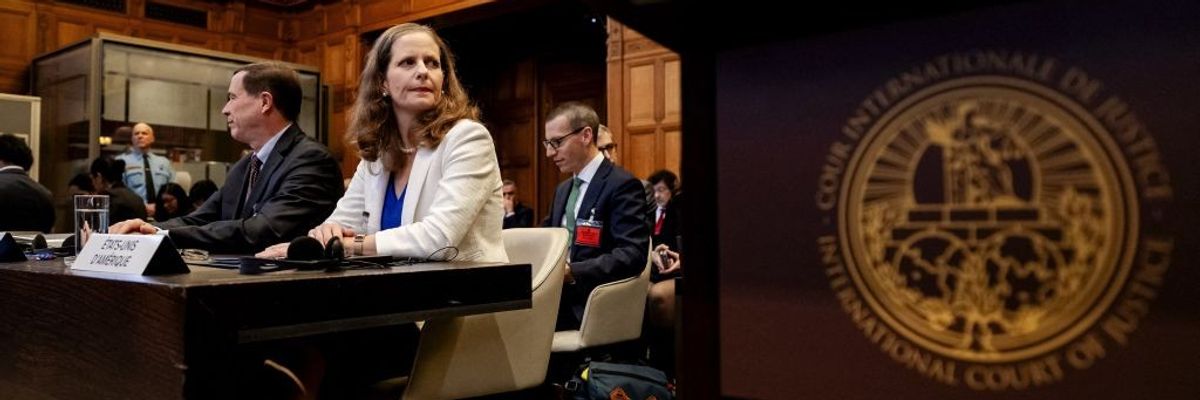The Biden administration faced backlash from scientists, advocacy groups, and vulnerable Pacific islands on Wednesday for arguing before the United Nations' highest court that the Paris agreement is sufficient and countries should not face additional legal obligations to fight the climate emergency.
The U.S. position, outlined at the International Court of Justice (ICJ) by State Department legal adviser Margaret Taylor, was deemed "morally bankrupt" by Oxfam America, which
decried the administration's insistence that "countries do not have clear legal obligations to reduce carbon pollution, especially as it prepares to turn over the executive office to a proven climate denier like President-elect [Donald] Trump."
"This opposition to strong international law on climate justice categorically undermines the Biden administration's climate legacy," Ashfaq Khalfan, Oxfam America's climate justice director, said Wednesday. "The U.S. has today denied any firm obligation to reduce carbon pollution to safer levels, phase out fossil fuel production, or provide funding to lower-income countries to help with renewable energy and protection from climate harms. Governments have failed to do what is necessary to protect humanity from the climate crisis, and it is essential that the ICJ holds them to account by pushing them towards concrete action to ensure climate justice."
Taylor argued during her presentation in The Hague on Wednesday that "the U.N. climate change regime, with the Paris agreement at its core, is the only international legal regime specifically designed by states to address climate change" and that "cooperative efforts through that regime provide the best hope for protecting the climate system for the benefit of present and future generations."
While technically a legally binding international treaty, the Paris accord has failed to arrest the rise of planet-warming carbon emissions, which have surged to an all-time high this year. The agreement—from which the U.S. is expected to withdraw for a second time under Trump—has no enforcement mechanism, and its language leaves ample room for countries to continue burning fossil fuels at levels that scientists say are incompatible with a livable future.
"The U.S. is content with its business-as-usual approach and has taken every possible measure to shirk its historical responsibility, disregard human rights, and reject climate justice."
Delta Merner, lead scientist for the Science Hub for Climate Litigation at the Union of Concerned Scientists, criticized the U.S.—the largest historical polluter—for resisting "calls for climate accountability" at Wednesday's ICJ hearing.
"Instead of taking responsibility for its contributions to the climate crisis, the United States used its 30-minute slot to downplay the role of the courts for global climate action, emphasize nonbinding national commitments under the Paris agreement, and reject the notion of historical responsibility," said Merner. "By framing climate change as a collective action challenge without clear legal obligations for individual states, the United States dismissed the potential for redress or binding accountability measures that advance justice for climate-vulnerable nations."
"In the face of stonewalling from major polluters, we applaud the leadership of Vanuatu and others for advancing this process," Merner added. "These proceedings must continue to center the voices of frontline communities."
The Pacific island of Vanuatu first launched the push for an ICJ advisory opinion on climate in 2021. Less than two years later, the U.N. General Assembly
approved a resolution calling on the ICJ to issue an opinion on countries' legal obligations regarding the global fight against climate change.
Ralph Regenvanu, Vanuatu's special envoy for climate change and environment,
criticized the U.S. presentation at Wednesday's landmark hearing and said treaties such as the Paris agreement can't be "a veil for inaction or a substitute for legal accountability."
"These nations—some of the world's largest greenhouse gas emitters—have pointed to existing treaties and commitments that have regrettably failed to motivate substantial reductions in emissions," said Regenvanu. "There needs to be an accounting for the failure to curb emissions and the climate change impacts and human rights violations that failure has generated."
Vishal Prasad, director of Pacific Islands Students Fighting Climate Change,
expressed outrage at what he described as "a disheartening attempt by the U.S. to evade its responsibilities as one of the world's largest polluters."
"The U.S. is content with its business-as-usual approach and has taken every possible measure to shirk its historical responsibility, disregard human rights, and reject climate justice," Prasad added.

